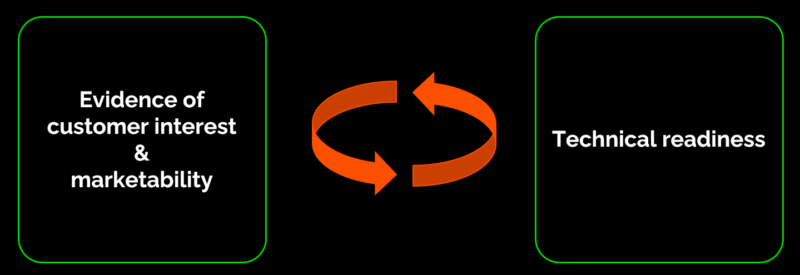Preproductization – UnSeen Labs
Preproductization is a test-driven business development service with the primary goal of securing an “insurance” for your investment. The idea is to offer better precision and predictability for productization.
Using our tools, we identify needs that you might not initially pay attention to. We create a concept of the best solution and assist in testing it before your major investment decision.
Preproductization combines all our services and expertise into one cohesive experience to ensure smooth development.

We combine technology and business objectives
Technological solutions should serve business goals, not dictate them. When appropriate technology aligns with your business objectives, you gain an unfair competitive advantage. Sometimes it’s necessary to determine right from the start whether a solution is technically feasible. Other times, you need to explore customer interest and gather evidence of marketability. We assist you in asking the right questions at the right time and finding the answers.

The tested and proven idea is gold
Our proven Preproductization service Unseen Labs helps you break the ice and find a winning solution to bring your ideas to life. We also have an exceptionally vast number of ideas to offer when you’re seeking solutions for your business challenges.
Typically, the Preproductization process begins with a collaborative exploration of what your customers are willing to pay for. In practice, we search for evidence of your customers’ interest and the marketability of the solution. If there is a need to ensure technical readiness along the way, it is typically done through the creation of a prototype.
Once Preproductization is concluded, you’ll have factual information to support your investment decision. You’ll have a commercial concept and feature specification, based on which you can start investigating the budget for implementation.
By applying this secret formula, the Preproductization process is tailored to fit your specific needs.
Concept
We find out what your customers really need. We brainstorm the best solution options and create a plan for their implementation.
Create
We turn the concept into reality. We test the concept with a UI demo, prototype, or pilot marketing.
Refine
We refine the concept based on feedback from your customers. We analyze the functionality of the technology and its business potential.
Decide
The results are available, and you decide: whether to take the solution to the market right away or to further polish it into an even stronger diamond.
To development project and beyond
For each development project, once the desired features are identified, the technical team begins contemplating the implementation from a technological standpoint. The goal is to find the best possible architecture and, consequently, a technical specification. Ideally, the technical spec becomes a detailed backlog.
With it, you can seek investment decisions for the development project and choose your partner.
After the investment decision is made, we are happy to be involved in your development project, where we can assist in various roles. However, using trial productization does not obligate you to this.
Solutions that make your customers eager to buy
Modern technologies create numerous opportunities to develop new business, generate a competitive edge, and provide value to customers. Thanks to our years of experience, we can guide you on which opportunities are worth seizing.
Whether it’s a software solution or a combination of software and hardware, the journey from idea to success requires knowledge, skill, and strong customer understanding. Our comprehensive productization process combines all of these: the result is a winning solution that, in the best case, propels your company’s growth.